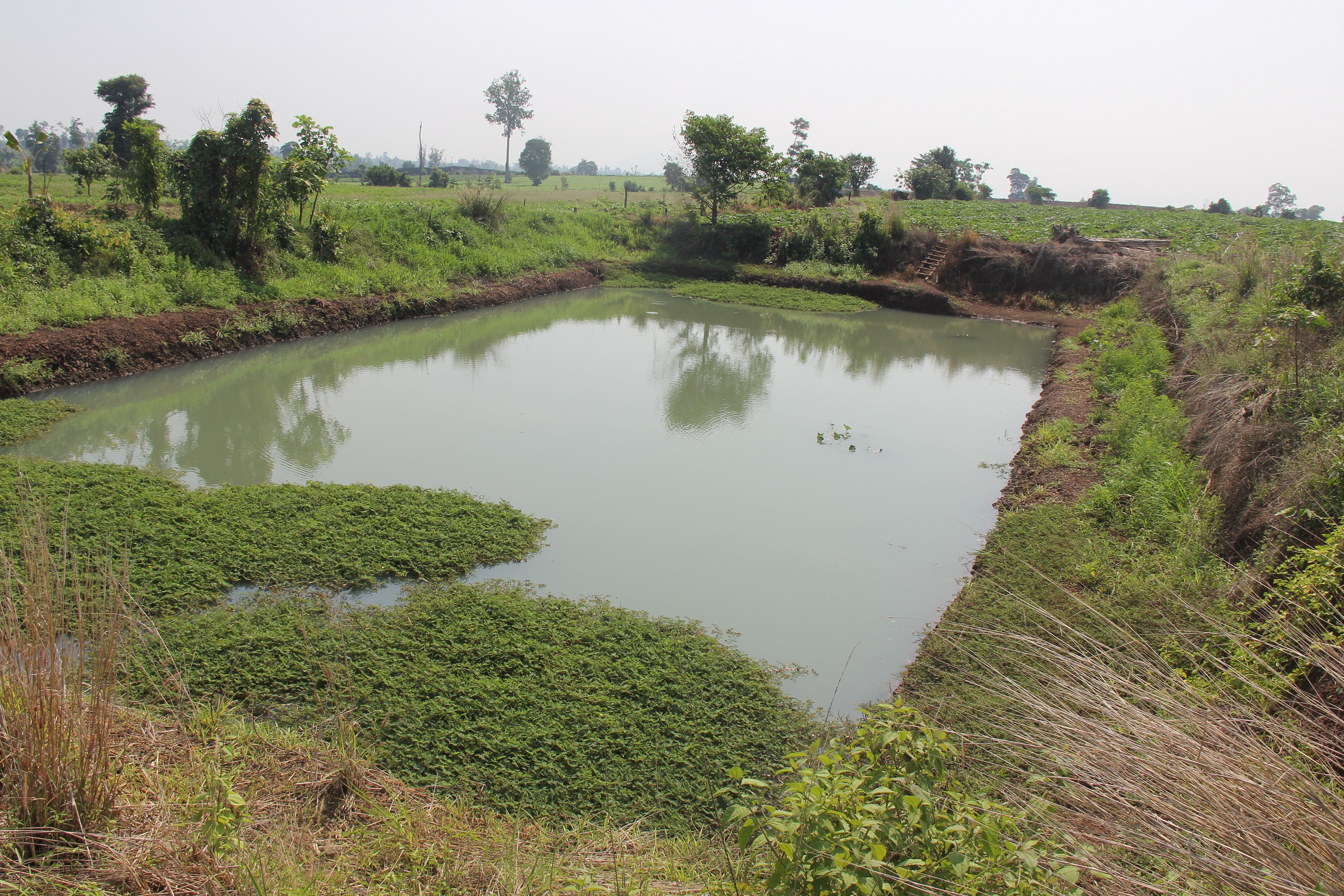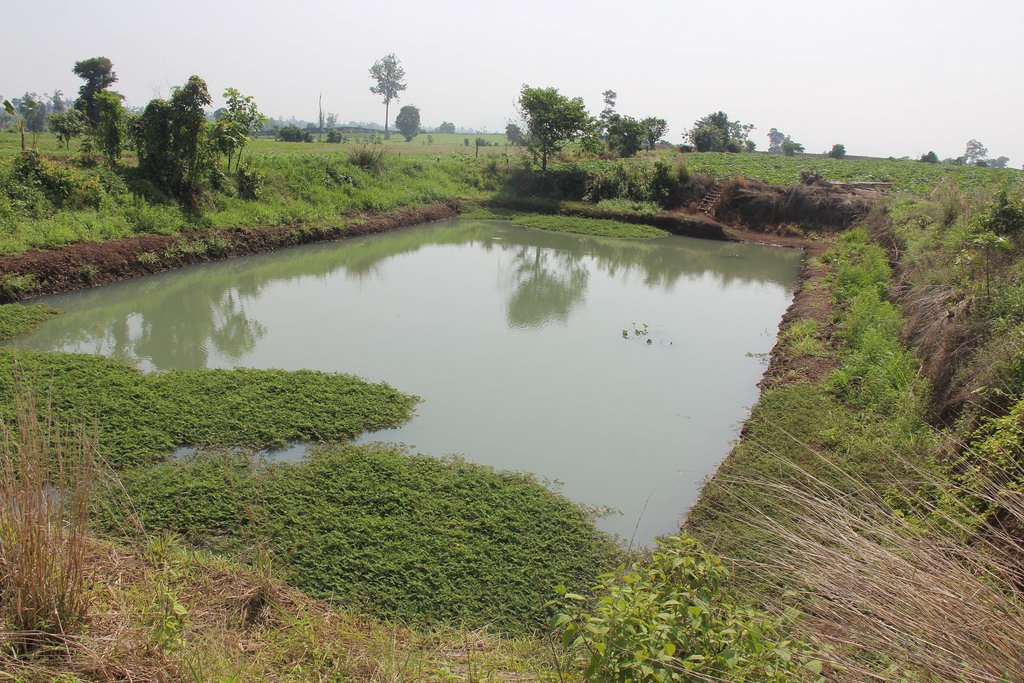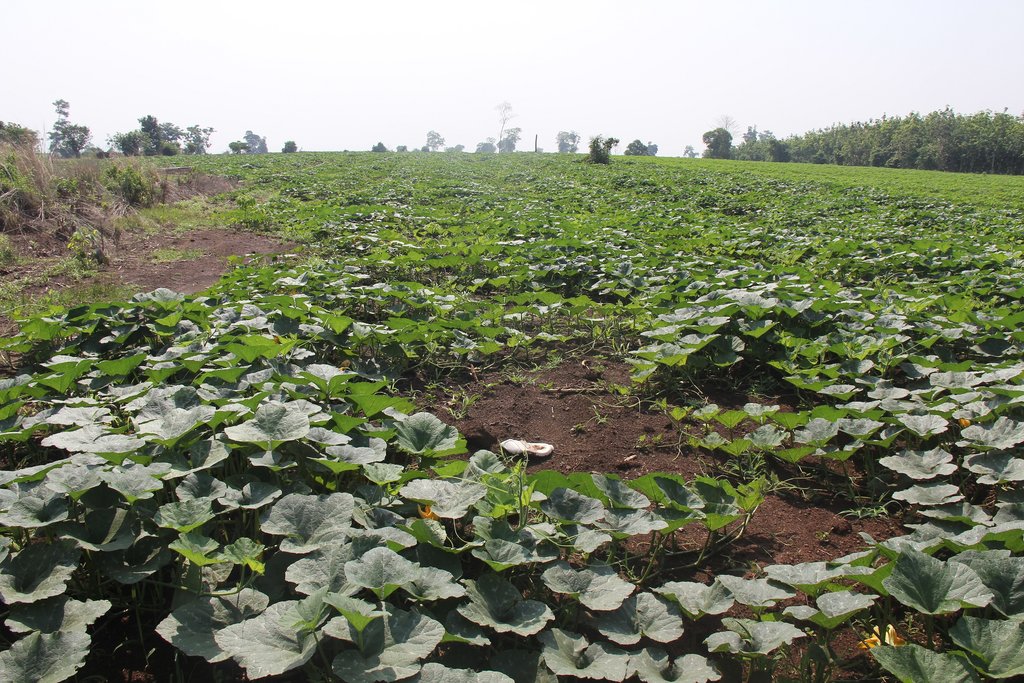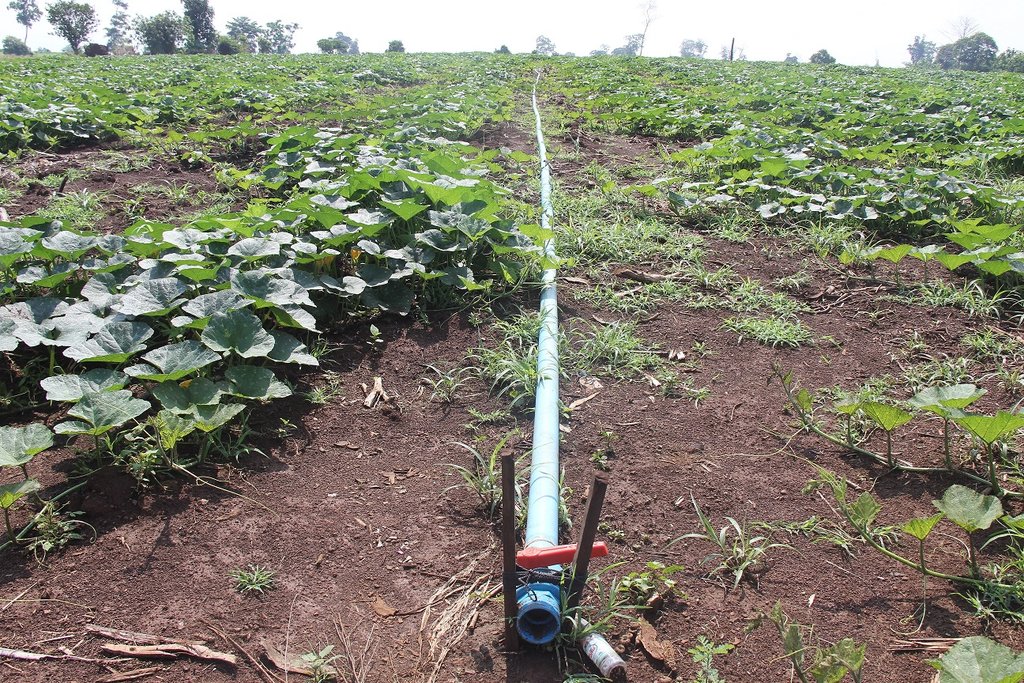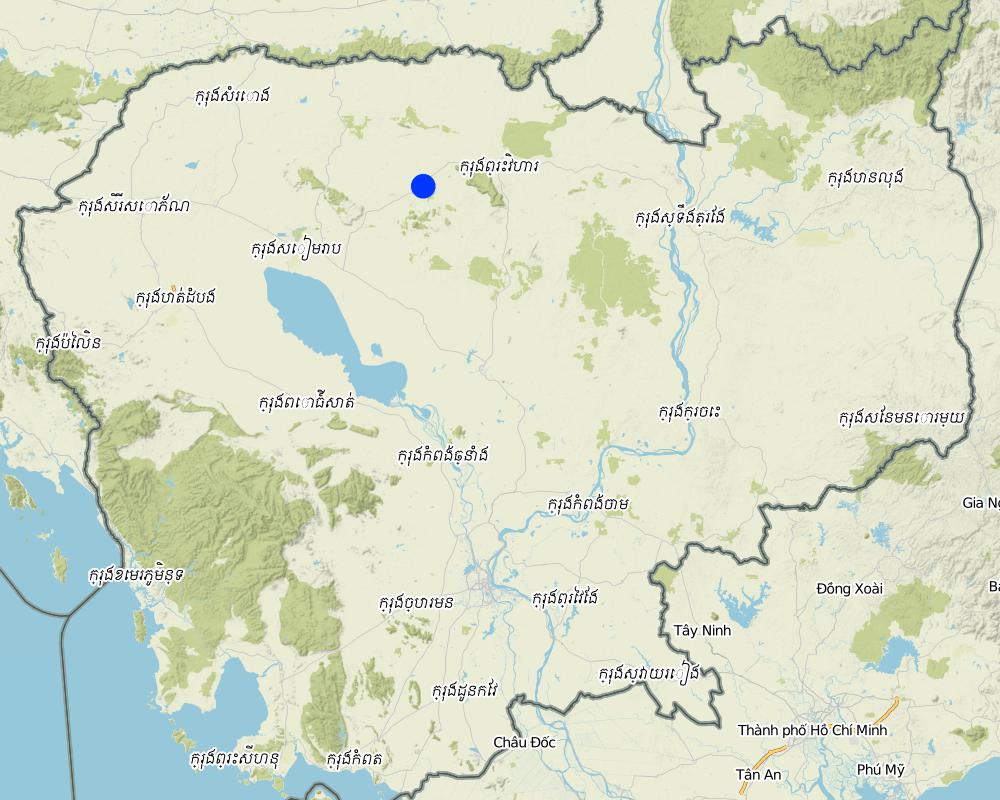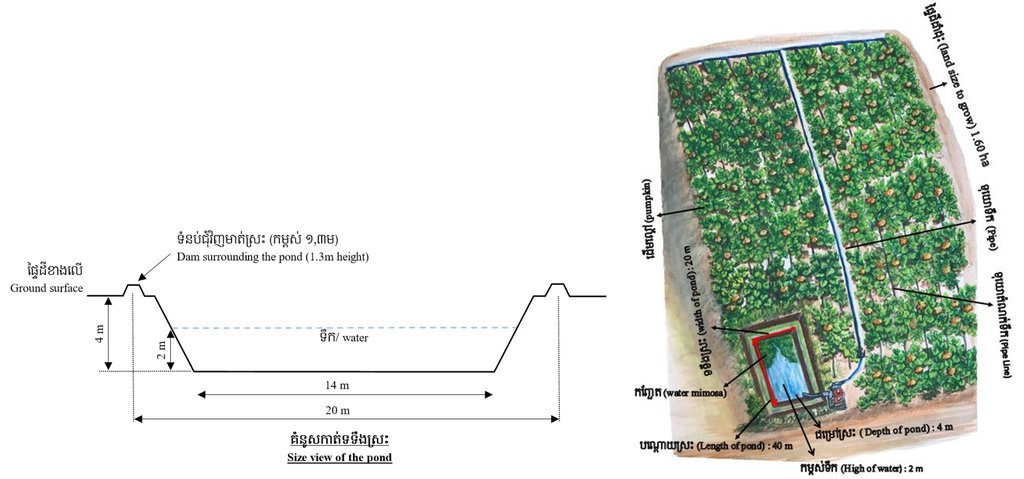ការជីកស្រះទឹកក្នុងចម្ការដើម្បីឆ្លើយតបទៅនឹងគ្រោះរាំងស្ងួត បង្កើនការដាំដុះ និងការចិញ្ចឹមត្រី [Cambodia]
- Creation:
- Update:
- Compiler: Nary Lay
- Editors: Navin Chea, Sophea Tim, Sok Pheak
- Reviewers: Nicole Harari, Nimul CHUN, Stephanie Jaquet, Alexandra Gavilano
technologies_2844 - Cambodia
View sections
Expand all Collapse all1. General information
1.2 Contact details of resource persons and institutions involved in the assessment and documentation of the Technology
Key resource person(s)
land user:
ម៉ាញ ហុង
កសិករ
Cambodia
ភ្នាក់ងារផ្សព្វផ្សាយឃុំស្រយ៉ង:
គុច (Kuch) វីន (Vin)
ភ្នាក់ងារផ្សព្វផ្សាយឃុំស្រយ៉ង
Cambodia
ប្រធានការិយាល័យកសិកម្ម រុក្ខាប្រមាញ់ និងនេសាទស្រុកគូលែន:
ប្រធានមជ្ឈមណ្ឌលសិក្សាស្រាវជ្រាវកសិកម្ម និងបរិស្ថាន:
ប្រធានការិយាល័យកសិកម្ម រុក្ខាប្រមាញ់ និងនេសាទ ស្រុករវៀង:
Name of project which facilitated the documentation/ evaluation of the Technology (if relevant)
Scaling-up SLM practices by smallholder farmers (IFAD)Name of the institution(s) which facilitated the documentation/ evaluation of the Technology (if relevant)
Royal University of Agriculture (RUA) - Cambodia1.3 Conditions regarding the use of data documented through WOCAT
The compiler and key resource person(s) accept the conditions regarding the use of data documented through WOCAT:
Ja
1.4 Declaration on sustainability of the described Technology
Is the Technology described here problematic with regard to land degradation, so that it cannot be declared a sustainable land management technology?
Nee
2. Description of the SLM Technology
2.1 Short description of the Technology
Definition of the Technology:
ការជីកស្រះក្នុងចំការដើម្បីស្តុកទឹកសម្រាប់ស្រោចស្រពដំណាំពេលរាំងស្ងួត គឺជាការធានានូវកង្វះខាតទឹក ពេលចាប់ផ្តើមដាំដុះ នៅមុនរដូវភ្លៀងធ្លាក់ និងក្រោយពេលរដូវភ្លៀង។ ការធ្វើបែបនេះគឺក្នុងគោលបំណងបង្កើនរដូវដាំដុះ។ ស្រះទឹកដែលចុះសិក្សានេះអាចស្តុកទុកទឹកបាន ២៤១២ ម៉ែត្រត្រីគុណ អាចស្រោចស្រពដីទំហំ ១.៦ ហិកតាឡើងទៅ ហើយកសិករអាចដាំដំណាំបានជាច្រើនសារក្នុងមួយឆ្នាំៗ ដោយសារតែវាអាចទប់ទល់ទៅនឹងបញ្ហាកង្វះខាតទឹកបណ្តាលមកពីភាពរាំងស្ងួត។
2.2 Detailed description of the Technology
Description:
នៅក្នុងតំបន់ដែលមានភ្លៀងធ្លាក់តិចតួច និងប្រព័ន្ធធារាសាស្ត្រមិនគ្រប់គ្រាន់ ការស្តុកទឹកទុកសម្រាប់ប្រើប្រាស់ដើរតួនាទីយ៉ាងសំខាន់នៅក្នុងផលិតកម្មដំណាំ និងចូលរួមចំណែកក្នុងការផ្គត់ផ្គង់ស្បៀងអាហារ។ បរិមាណទឹកដែលអាចរកបានគឺជាកត្តាមួយដ៏សំខាន់ដែលកសិករត្រូវយកចិត្តទុកដាក់។ លើសពីនេះ ការប្រែប្រួលអាកាសធាតុគឺជាបញ្ហាចម្បងមួយទៀត បន្ថែមទៅលើបញ្ហាខាងលើ ដែលបញ្ហានេះបង្កផលប៉ះពាល់យ៉ាងធ្ងន់ធ្ងរដល់ការងារដាំដុះរបស់កសិករ ព្រោះថាវានឹងនាំឱ្យទិន្នផលធ្លាក់ចុះ មានការកើតជំងឺសត្វល្អិតរាតត្បាត ភ្លៀងធ្លាក់មិនទៀងទាត់ គ្រោះរាំងស្ងួត និងទឹកជំនន់ជាដើម។
ដើម្បីឆ្លើយតបទៅនឹងបញ្ហាខាងលើ កសិករបានជីកស្រះទឹកក្នុងចំការ និងប្រើប្រាស់ប្រព័ន្ធតំណក់ទឹកសម្រាប់ស្រោចស្រពដំណាំ។ ការជីកស្រះនេះមានគោលបំណងពីរគឺ ទី១៖ យកទឹកមកស្រោចស្រពដំណាំនៅពេលរាំងស្ងួត និងគោលបំណងទី២៖ គឺសម្រាប់ចិញ្ចឹមត្រី និងបង្កើនការដាំដុះបន្ថែមដូចជាការដាំបន្លែជាដើម។ ការរៀបចំប្រព័ន្ធស្តុកទឹកក្នុងចម្ការបែបនេះជាការអនុវត្តកសិកម្មឆ្លាតវ័យ ដែលមានភាពធន់ទ្រាំទៅនឹងការប្រែប្រួលអាកាសធាតុ (កសិកម្មឆ្លាតខាងអាកាសធាតុ) ព្រោះកសិករអាចមានទឹកប្រើប្រាស់គ្រប់រដូវកាល។
ចំពោះការប្រើប្រាស់ប្រព័ន្ធតំណក់ទឹកគឺជួយសន្សំសំចៃទឹក និងពេលវេលា កាត់បន្ថយកម្លាំងពលកម្មសម្រាប់ការស្រោចស្រព ធ្វើឱ្យដំណាំដុះលូតលាស់បានល្អ កាត់បន្ថយរំហួត និងការហូរច្រោះ ព្រមទាំងជួយកាត់បន្ថយការដុះស្មៅចង្រៃ និងសត្វល្អិតបានមួយចំនួនទៀតផង។ ដូចនេះ ប្រព័ន្ធតំណក់ទឹកគឺសមស្របបំផុតក្នុងការប្រើប្រាស់ទឹកប្រកបដោយប្រសិទ្ធិភាពសម្រាប់ការស្រោចស្រព ដើម្បីឆ្លើយតបទៅនឹងការប្រែប្រួលអាកាសធាតុដូចជាគ្រោះរាំងស្ងួតតាមរដូវកាល។
មុននឹងសម្រេចចិត្តជីកស្រះ កសិករបានធ្វើការសង្កេតនិងស្វែងយល់ពីប្រភពទឹកក្រោមដី អស់រយៈពេល ២ឆ្នាំ តាមរយៈបទពិសោធន៍របស់គាត់ ដោយអង្កេតមើលអណ្តូងទឹករបស់អ្នកជិតខាងនៅក្បែរៗចម្ការរបស់គាត់។ ទីតាំងដែលបានសម្រេចចិត្តជីកស្រះ គឺនៅកន្លែងទាបបំផុតនៃដីរបស់គាត់ ហើយការសម្រេចចិត្តនេះក៏បានផ្អែកលើការដែលពិនិត្យឃើញថាអណ្តូងដែលនៅជិតចម្ការរបស់គាត់មានទឹកគ្រប់គ្រាន់។ ដូចនេះ ស្រះទឹកនេះប្រមូលនូវប្រភពទឹកភ្លៀងផង និងមានដង្ហើមទឹកក្រោមដីផង។
ការជីកស្រះនេះកសិករមិនបានចំណាយថវិកានោះទេ ព្រោះគាត់បានព្រមព្រៀងជាមួយអ្នកជីកដែលមានអេស្កាវ៉ាទ័រ ដោយក្នុងនោះអ្នកជីកយកអាចម៍ដីលក់ហើយម្ចាស់ចម្ការទទួលបានស្រះទឹកដោយមិនចំណាយលើថ្លៃជីក។ ស្រះទឹកនេះមានទំហំមាត់ស្រះ ៤០ ម៉ែត្រ×២០ ម៉ែត្រ និងបាតស្រះទំហំ ២៩ ម៉ែត្រ×១៤ ម៉ែត្រ មានជម្រៅ ៤ម៉ែត្រ និងកម្ពស់ទឹកក្នុងស្រះ ២ ម៉ែត្រ អាចស្រោចស្រពដំណាំលើផ្ទៃដីចំនួន ១.៦០ ហិកតានៅរដូវប្រាំង និងអាចដាំដំណាំបានពីរសារក្នុងមួយឆ្នាំ។ កសិករក៏បានចិញ្ចឹមកូនត្រីទីឡាបយ៉ា ចំនួន ៦០០កូន (៦ គីឡូក្រាមកូនត្រី)ផងដែរ។ ប្រសិនបើមិនមានការសហការជាមួយនឹងអ្នកជីកទេ ការជីកស្រះនេះ ត្រូវចំណាយលុយប្រហែល ៨០០០០០០ រៀល (ប្រហែល ២០០០ដុល្លាអាមេរិក)។
បន្ទាប់ពីជីកស្រះរួចកសិករអាចដាំដំណាំច្រើនជាងមុន ទទួលបានផលច្រើនជាងមុន និងអាចដាំល្ពៅបាននៅខែប្រាំងដោយមានទឹកស្រះប្រើប្រាស់គ្រប់គ្រាន់។ កាលពីមុនកសិករមិនហ៊ានដាំល្ពៅទេព្រោះមិនមានទឹកគ្រប់គ្រាន់សម្រាប់ស្រោចស្រព ប៉ុន្តែបច្ចុប្បន្នគាត់អាចដាំបាន និងចំណេញពេលវេលាព្រោះអាចដាំដំណាំមុនរដូវបាន។ លើសពីនេះទៅទៀត កសិករជិតខាងក៏អាចយកទឹកនេះទៅប្រើប្រាស់បានផងដែរ។
2.3 Photos of the Technology
2.5 Country/ region/ locations where the Technology has been applied and which are covered by this assessment
Country:
Cambodia
Region/ State/ Province:
ភូមិស្រយ៉ងត្បូង ឃុំស្រយ៉ង ស្រុកគូលែន ខេត្តព្រះវិហារ
Specify the spread of the Technology:
- applied at specific points/ concentrated on a small area
Comments:
ដីចម្ការគាត់ដែលជីកស្រះនៅក្នុងភូមិស្រយ៉ង់ត្បូង
កសិករអាចពង្រីកការដាំដំណាំបានច្រើនជាងមុន បន្ទាប់ពីមានទឹកស្រោចស្រពគ្រប់គ្រាន់។
Map
×2.6 Date of implementation
Indicate year of implementation:
2013
2.7 Introduction of the Technology
Specify how the Technology was introduced:
- through land users' innovation
Comments (type of project, etc.):
កសិករបានសិក្សាពីខ្សែទឹកក្រោមដីនៅជុំវិញបរិវេនតំបន់នេះរយៈពេលប្រហែល២ឆ្នាំ។
3. Classification of the SLM Technology
3.1 Main purpose(s) of the Technology
- improve production
- adapt to climate change/ extremes and its impacts
- create beneficial social impact
- អាចដាំដំណាំបានគ្រប់រដូវ និងមុនខែធ្លាក់ភ្លៀង
3.2 Current land use type(s) where the Technology is applied

Cropland
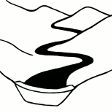
Waterways, waterbodies, wetlands
- Ponds, dams
Main products/ services:
តាំងពីជីកស្រះមកមានទឹកប្រើប្រាស់គ្រប់គ្រាន់ ហើយកាលមិនទាន់ជីកស្រះកសិករដាំពោត សណ្តែកបាយ និងសណ្តែកសៀងដោយពឹងផ្អែកលើទឹកភ្លៀង។ ឥឡូវគាត់អាចដាំល្ពៅបានផងដែរ ប្រសិនបើមិនមានភ្លៀង ៣-៤ ថ្ងៃ កសិករចាប់ផ្តើមបូមទឹកស្រះស្រោចដំណាំល្ពៅ
Comments:
ស្រះនេះអាចស្រោចស្រពគ្រប់រដូវនៅលើផ្ទៃដីចំនួន ១.៦០ ហិកតា។ កាលពីមិនទាន់មានស្រះគាត់ដាំតែពោត សណ្តែក ដោយសារវាមិនត្រូវការទឹក តែឥឡូវគាត់អាចដាំមុនរដូវភ្លៀងបាន។
ចំនួនសារដែលដាំដំណាំក្នុងមួយឆ្នាំ: 2
3.3 Has land use changed due to the implementation of the Technology?
Has land use changed due to the implementation of the Technology?
- Yes (Please fill out the questions below with regard to the land use before implementation of the Technology)

Cropland

Forest/ woodlands
Comments:
កាលពីមុនជាដីព្រៃរិករិល ក្រោយពីកាប់ព្រៃអស់ និងចាប់ផ្តើមដាំដំណាំ ហើយដីចាប់ផ្តើមមិនសូវមានជីជាតិ តែពេលជីកស្រះហើយធ្វើឱ្យដីធូរមានសំណើមជាងមុន។
3.4 Water supply
Water supply for the land on which the Technology is applied:
- mixed rainfed-irrigated
3.5 SLM group to which the Technology belongs
- water harvesting
- irrigation management (incl. water supply, drainage)
3.6 SLM measures comprising the Technology
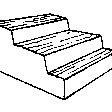
structural measures
- S5: Dams, pans, ponds
- S7: Water harvesting/ supply/ irrigation equipment
3.7 Main types of land degradation addressed by the Technology

soil erosion by water
- Wt: loss of topsoil/ surface erosion
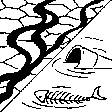
water degradation
- Ha: aridification
- Hs: change in quantity of surface water
3.8 Prevention, reduction, or restoration of land degradation
Specify the goal of the Technology with regard to land degradation:
- prevent land degradation
- reduce land degradation
4. Technical specifications, implementation activities, inputs, and costs
4.1 Technical drawing of the Technology
Technical specifications (related to technical drawing):
ត្រូវបានជីកនៅត្រង់ផ្នែកទំនាបបំផុតនៃដីចម្ការ ស្រះទឹកនេះមានទំហំមាត់ស្រះ ៤០ម៉ែត្រ x ២០ម៉ែត្រ និងទំហំបាតស្រះមាន ២៩ម៉ែត្រ x ១៤ម៉ែត្រ។ ស្រះមានជម្រៅ ៤ ម៉ែត្រ និងមានជម្រៅទឹកក្នុងស្រះ ២ម៉ែត្រ។ បរិមាណទឹកក្នុងស្រះទាំងនៅរដូវប្រាំ និងរដូវវស្សាគឺមានបរិមាណប្រហាក់ប្រហែលគ្នា។ កសិករបានធ្វើទំនប់នៅជុំវិញមាត់ស្រះកម្ពស់ ១.៣ម៉ែត្រ ដើម្បីការពារការហូរបាក់ដីចូលក្នុងស្រះនៅរដូវភ្លៀង។ កសិករក៏បានដាំស្មៅនៅលើខ្នងនិងជើងទំនប់ផងដែលដើម្បីការពារការហូរច្រោះ ហើយបានដាក់កញ្ឆែតនៅក្នុងស្រះដើម្បីជាការសម្អាតទឹកផង និងជាចំណីត្រីផង។
Author:
លោក ឃួន សុផល និង លោក ទឹម សុភា
Date:
04/05/2017
4.2 General information regarding the calculation of inputs and costs
Specify how costs and inputs were calculated:
- per Technology unit
Specify unit:
ស្រះ និងប្រព័ន្ធដំណក់ទឹក
Specify dimensions of unit (if relevant):
ស្រះទំហំ ៤០ ម៉ែត្រ× ២០ ម៉ែត្រ ទុយោមេ និងទុយោមេរង ២២០ ម៉ែត្រ ទុយោដំណក់ទឹក ៥០០ ម៉ែត្រ
other/ national currency (specify):
រៀល
If relevant, indicate exchange rate from USD to local currency (e.g. 1 USD = 79.9 Brazilian Real): 1 USD =:
4000.0
Indicate average wage cost of hired labour per day:
20000 រៀល
4.3 Establishment activities
| Activity | Timing (season) | |
|---|---|---|
| 1. | ការជីកស្រះដោយប្រើគ្រឿងចក្រ | ធ្នូ |
| 2. | ការធ្វើទំនប់ទឹកស្រះ | ធ្នូ |
| 3. | ម៉ាស៊ីនបូមទឹក | ធ្នូ |
| 4. | រៀបចំ និងដំឡើងប្រព័ន្ធតំណក់ទឹក | កុម្ភៈ |
| 5. | ដាំស្មៅលើទំនប់ និងដាក់កញ្ឆែតក្នុងស្រះ | ឧសភា |
Comments:
ជួលគ្រឿងចក្រ 1 ម៉ោង 200000 រៀល។
4.4 Costs and inputs needed for establishment
| Specify input | Unit | Quantity | Costs per Unit | Total costs per input | % of costs borne by land users | |
|---|---|---|---|---|---|---|
| Labour | ជីកស្រះ និងធ្វើភ្លឺ (ប្រើអេស្កាវ៉ាទ័រ) | ម៉ោង | 40.0 | 200000.0 | 8000000.0 | |
| Labour | រៀបចំ និងដំឡើងប្រព័ន្ធតំណក់ទឹក | នាក់-ថ្ងៃ | 2.0 | 40000.0 | 80000.0 | 100.0 |
| Equipment | ម៉ាស៊ីនបូមទឹក + ប្រព័ន្ធទុយោដំណក់ | គ្រឿង | 1.0 | 2720000.0 | 2720000.0 | 100.0 |
| Total costs for establishment of the Technology | 10800000.0 | |||||
| Total costs for establishment of the Technology in USD | 2700.0 | |||||
If land user bore less than 100% of costs, indicate who covered the remaining costs:
ម្ចាស់គ្រឿងចក្រ
Comments:
ដោយម្ចាស់គ្រឿងចក្រយកដីលក់ ហើយម្ចាស់ដីទទួលបានស្រះ។ គាត់ជីកស្រះនៅចុងខែធ្នូ និងដើមខែមករា ឆ្នាំ២០១៣។
4.5 Maintenance/ recurrent activities
| Activity | Timing/ frequency | |
|---|---|---|
| 1. | ការស្ការស្រះ | ខែប្រាំង |
| 2. | ការជួសជុលភ្លឺស្រះ | ពេលរាំងភ្លៀង |
| 3. | សកម្មភាពបូមទឹកស្រោចដំណាំ | ពេលរាំងស្ងួត |
4.6 Costs and inputs needed for maintenance/ recurrent activities (per year)
| Specify input | Unit | Quantity | Costs per Unit | Total costs per input | % of costs borne by land users | |
|---|---|---|---|---|---|---|
| Labour | ស្តារស្រះ និងទប់ភ្លឺស្រះ | នាក់-ថ្ងៃ | 7.0 | 20000.0 | 140000.0 | 100.0 |
| Construction material | ប្រេងបូមស្តារស្រះ | លីត្រ | 30.0 | 2800.0 | 84000.0 | 100.0 |
| Total costs for maintenance of the Technology | 224000.0 | |||||
| Total costs for maintenance of the Technology in USD | 56.0 | |||||
4.7 Most important factors affecting the costs
Describe the most determinate factors affecting the costs:
ថ្លៃឈ្នួលជីកស្រះមានតម្លៃខ្ពស់ណាស់។ ប៉ុន្តែ គេអាចធ្វើទៅបានដោយការសហការជាមួយអ្នកជិកខាងដោយប្រគល់អាចម៍ដីជីកទៅម្ចាស់អិចស្កាវ៉ូទ័រសម្រាប់លក់ ហើយម្ចាស់ដីបានស្រះទឹក។
5. Natural and human environment
5.1 Climate
Annual rainfall
- < 250 mm
- 251-500 mm
- 501-750 mm
- 751-1,000 mm
- 1,001-1,500 mm
- 1,501-2,000 mm
- 2,001-3,000 mm
- 3,001-4,000 mm
- > 4,000 mm
Specify average annual rainfall (if known), in mm:
1102.02
Specifications/ comments on rainfall:
បរិមាណទឹកភ្លៀងប្រចាំឆ្នាំ ២០១៥ មានចំនួន ១១០២.០២ មម ឆ្នាំ ២០១៤ មានចំនួន ៨៧៨.១៣ មម និងឆ្នាំ ២០១៣ មានចំនួន ១៣៩៣.៥មម
Indicate the name of the reference meteorological station considered:
ក្រសួងធនធានទឹក និងឧត្តុនិយម នាយកដ្ឋានឧត្តុនិយមឆ្នាំ២០១៥
Agro-climatic zone
- sub-humid
មានរដូវពីរគឺរដូវប្រាំង និងរដូវវស្សា
5.2 Topography
Slopes on average:
- flat (0-2%)
- gentle (3-5%)
- moderate (6-10%)
- rolling (11-15%)
- hilly (16-30%)
- steep (31-60%)
- very steep (>60%)
Landforms:
- plateau/plains
- ridges
- mountain slopes
- hill slopes
- footslopes
- valley floors
Altitudinal zone:
- 0-100 m a.s.l.
- 101-500 m a.s.l.
- 501-1,000 m a.s.l.
- 1,001-1,500 m a.s.l.
- 1,501-2,000 m a.s.l.
- 2,001-2,500 m a.s.l.
- 2,501-3,000 m a.s.l.
- 3,001-4,000 m a.s.l.
- > 4,000 m a.s.l.
Indicate if the Technology is specifically applied in:
- concave situations
Comments and further specifications on topography:
ជាដីជម្រាលដែលមានកម្រិតជម្រាលប្រហែល ៩ដឺក្រេ។
5.3 Soils
Soil depth on average:
- very shallow (0-20 cm)
- shallow (21-50 cm)
- moderately deep (51-80 cm)
- deep (81-120 cm)
- very deep (> 120 cm)
Soil texture (topsoil):
- medium (loamy, silty)
Soil texture (> 20 cm below surface):
- coarse/ light (sandy)
Topsoil organic matter:
- medium (1-3%)
If available, attach full soil description or specify the available information, e.g. soil type, soil PH/ acidity, Cation Exchange Capacity, nitrogen, salinity etc.
ដីស្រទាប់ក្រោមជាប្រភេទដីគ្រួស ថ្មបាយគ្រាម និងមាន pH = 4.5 ហើយដីស្រទាប់លើជាដីល្បាប់។
5.4 Water availability and quality
Ground water table:
5-50 m
Availability of surface water:
good
Water quality (untreated):
for agricultural use only (irrigation)
Is water salinity a problem?
Nee
Is flooding of the area occurring?
Nee
5.5 Biodiversity
Species diversity:
- low
Habitat diversity:
- low
5.6 Characteristics of land users applying the Technology
Sedentary or nomadic:
- Sedentary
Market orientation of production system:
- commercial/ market
Off-farm income:
- less than 10% of all income
Relative level of wealth:
- average
Individuals or groups:
- individual/ household
Level of mechanization:
- mechanized/ motorized
Gender:
- men
Age of land users:
- middle-aged
Indicate other relevant characteristics of the land users:
កសិករមានអាយុ ៣៤ ឆ្នាំ។
5.7 Average area of land used by land users applying the Technology
- < 0.5 ha
- 0.5-1 ha
- 1-2 ha
- 2-5 ha
- 5-15 ha
- 15-50 ha
- 50-100 ha
- 100-500 ha
- 500-1,000 ha
- 1,000-10,000 ha
- > 10,000 ha
Is this considered small-, medium- or large-scale (referring to local context)?
- medium-scale
Comments:
ដីផ្ទាល់ខ្លួន 2 ហិកតា(ស្រែ និងដីដាំដំណាំ) ដីជួលគេ 6 ហិកតា
5.8 Land ownership, land use rights, and water use rights
Land ownership:
- individual, titled
- ដីជួលគេ
Land use rights:
- leased
- individual
Water use rights:
- individual
5.9 Access to services and infrastructure
health:
- poor
- moderate
- good
education:
- poor
- moderate
- good
technical assistance:
- poor
- moderate
- good
employment (e.g. off-farm):
- poor
- moderate
- good
markets:
- poor
- moderate
- good
energy:
- poor
- moderate
- good
roads and transport:
- poor
- moderate
- good
drinking water and sanitation:
- poor
- moderate
- good
financial services:
- poor
- moderate
- good
6. Impacts and concluding statements
6.1 On-site impacts the Technology has shown
Socio-economic impacts
Production
crop production
Comments/ specify:
កសិករអាចដាំដំណាំច្រើនមុខរួមទាំងល្ពៅនៅរដូវប្រាំង
crop quality
Comments/ specify:
ដំណាំលូតលាស់បានល្អ ហើយផលិតបានទិន្នផលខ្ពស់ជាងមុនដោយសារមានទឹកស្រោចស្រពគ្រប់គ្រាន់។
risk of production failure
Comments/ specify:
មានទឹកស្រោចស្រពគ្រប់គ្រាន់ទោះជាក្នុងពេលរាំងស្ងួតក៏ដោយ
product diversity
Comments/ specify:
អាចដាំដំណាំបានច្រើនមុខ
land management
Quantity before SLM:
ដីមិនសូវមានសំណើម
Quantity after SLM:
ដីមានសំណើមល្អជាងមុន
Comments/ specify:
ស្រះបានផ្តល់ទឹកគ្រប់គ្រាន់ដល់ដី
Water availability and quality
drinking water availability
Comments/ specify:
ទឹកស្រះអាចប្រើសម្រាប់ហូប ឬផឹកបានបន្ទាប់ពីដាំឱ្យពុះ
drinking water quality
Comments/ specify:
ទឹកស្រះអាចប្រើសម្រាប់ហូប ឬផឹកបានបន្ទាប់ពីដាំឱ្យពុះ
irrigation water availability
Comments/ specify:
ស្រះមានទឹកគ្រប់គ្រាន់នៅគ្រប់រដូវ
irrigation water quality
Comments/ specify:
ទឹកស្រះមិនមានផ្ទុកសារធាតុរ៉ែគ្រោះថ្នាក់ដូចទឹកបូមផ្ទាល់ពីអណ្តូងដែលអាចប៉ះពាល់ដំណាំនោះទេ។
demand for irrigation water
Comments/ specify:
ដាំដំណាំកាន់តែច្រើន ប៉ុន្តែតម្រូវការទឹកល្មមដោយសារប្រើប្រព័ន្ធស្រោចស្រពដោយដំណក់
Income and costs
expenses on agricultural inputs
Comments/ specify:
ការដាំដំណាំច្រើន និងប្រើប្រាស់ប្រព័ន្ធស្រោចស្រពដោយដំណក់
farm income
Comments/ specify:
ទទួលបានទិន្នផលល្អគ្រប់ដំណាំបន្ទាប់ពីមានទឹកស្រោចស្រពគ្រប់គ្រាន់
Socio-cultural impacts
SLM/ land degradation knowledge
Comments/ specify:
ការដាំដំណាំច្រើនមុខ កសិករបានបង្កើនចំណេះដឹង និងបទពិសោធន៍ច្រើនជាមួយនឹងការអនុវត្តន៍។
Ecological impacts
Water cycle/ runoff
water quantity
Comments/ specify:
ទឹកអាចរកបានគ្រប់គ្រាន់ពីស្រះ
water quality
Comments/ specify:
ដោយមានទំនប់ជុំវិញស្រះ ហើយកញ្ឆែតបានជួយរក្សាទឹក
harvesting/ collection of water
Comments/ specify:
ស្រះប្រមូលយកទឹកភ្លៀងផង និងភ្ជាប់ទៅដង្ហើមទឹកក្រោមដីផង។
groundwater table/ aquifer
Comments/ specify:
ស្រះភ្ជាប់ទៅដង្ហើមទឹកក្រោមដី។
Soil
soil moisture
Comments/ specify:
មានដំណាំច្រើនជាគម្របដែលជួយបន្ថយរំហួត
soil cover
Comments/ specify:
មានដំណាំច្រើនគ្រប់រដូវ ដោយសារមានទឹកស្រោចស្រពគ្រប់គ្រាន់
soil loss
Comments/ specify:
ដំណាំច្រើននៅគ្រប់រដូវជាគម្របដី
Biodiversity: vegetation, animals
plant diversity
Comments/ specify:
ទឹកគ្រប់គ្រាន់មានអំណោយផលល្អដល់ការលូតលាស់របស់រុក្ខជាតិ។
Climate and disaster risk reduction
drought impacts
Comments/ specify:
ស្រះទឹកអាចដោះស្រាយបញ្ហារាំងស្ងួត ព្រោះវាផ្តល់ទឹកគ្រប់គ្រាន់ពីប្រភពទឹកក្រោមដី។
6.2 Off-site impacts the Technology has shown
damage on neighbours' fields
Comments/ specify:
កសិករជិតខាងខ្លះក៏បានយកទឹកស្រះទៅប្រើប្រាស់នៅក្នុងគេហដ្ឋានរបស់ពួកគេផងដែរ។
Specify assessment of off-site impacts (measurements):
កសិករអាចប្រើប្រាស់ទឹកជាទៀងទាត់ដោយសារតែវាអាចរកបាន
6.3 Exposure and sensitivity of the Technology to gradual climate change and climate-related extremes/ disasters (as perceived by land users)
Gradual climate change
Gradual climate change
| Season | increase or decrease | How does the Technology cope with it? | |
|---|---|---|---|
| annual temperature | increase | moderately | |
| seasonal temperature | wet/ rainy season | increase | very well |
| annual rainfall | decrease | very well | |
| seasonal rainfall | wet/ rainy season | decrease | very well |
| other gradual climate change | កំដៅកើនឡើងជាងមុន | increase | very well |
Climate-related extremes (disasters)
Biological disasters
| How does the Technology cope with it? | |
|---|---|
| epidemic diseases | moderately |
| insect/ worm infestation | moderately |
Comments:
មានទឹកស្រះអាចដាំបន្លែ ឬដាំដំណាំពេលណាក៏បាន
6.4 Cost-benefit analysis
How do the benefits compare with the establishment costs (from land users’ perspective)?
Short-term returns:
positive
Long-term returns:
positive
How do the benefits compare with the maintenance/ recurrent costs (from land users' perspective)?
Short-term returns:
positive
Long-term returns:
positive
Comments:
កសិករផ្សេងមានការចាប់អារម្មណ៍លើស្រះទឹកដែរ ប៉ុន្តែតែមិនហ៊ានជីកព្រោះខ្លាចអត់មានដង្ហើមទឹកក្រោមដីគ្រប់គ្រាន់នៅត្រង់ដីចម្ការរបស់ពួកគេ។
6.5 Adoption of the Technology
- single cases/ experimental
Of all those who have adopted the Technology, how many did so spontaneously, i.e. without receiving any material incentives/ payments?
- 91-100%
Comments:
មិនមានកសិករដទៃទៀតនៅក្នុងតំបន់នេះធ្វើដូចនេះទេ គឺពួកគេបារម្ភថាមិនមានប្រភពទឹកគ្រប់គ្រាន់ដែលនាំឱ្យខាតលុយក្នុងការវិនិយោគលើស្រះ។
6.6 Adaptation
Has the Technology been modified recently to adapt to changing conditions?
Nee
6.7 Strengths/ advantages/ opportunities of the Technology
| Strengths/ advantages/ opportunities in the land user’s view |
|---|
| មានទឹកគ្រប់គ្រាន់សម្រាប់ស្រោចស្រពដំណាំ |
| មានជម្រើសក្នុងដាំដំណាំបានច្រើនប្រភេទ ព្រោះមានទឹកគ្រប់គ្រាន់ |
| Strengths/ advantages/ opportunities in the compiler’s or other key resource person’s view |
|---|
| អាចស្តុកទឹកសម្រាប់ស្រោចស្រពនៅរដូវប្រាំង និងពេលរាំងស្ងួតបាន |
| អ្នកជិតខាងអាចប្រើប្រាស់ទឹកស្រះនេះបាន |
| ការចិញ្ចឹមត្រីខ្នាតតូចអាចក្លាយជាសក្តានុពល និងសក្តានុពលនៃការដាំរុក្ខជាតិក្នុងទឹកមួយចំនួនដែលអាចជាបន្លែ |
6.8 Weaknesses/ disadvantages/ risks of the Technology and ways of overcoming them
| Weaknesses/ disadvantages/ risks in the land user’s view | How can they be overcome? |
|---|---|
| បាត់បង់ដីខ្លះដាំដុះដោយសារជីស្រះ | ដោយប្តូរមកចិញ្ចឹមត្រីវិញ |
| ការជីកស្រះគឺមានតម្លៃថ្លៃ | ស្វែងរកការសហការណ៍ជាមួយដៃគូ ដូចជាម្ចាស់អេស្តាវ៉ាទ័រ សម្រាប់ជាប្រយោជន៍ទៅវិញទៅមក |
| ត្រូវការស្តារស្រះពីរបីឆ្នាំម្តង | ជួលគេឱ្យធ្វើវា |
| Weaknesses/ disadvantages/ risks in the compiler’s or other key resource person’s view | How can they be overcome? |
|---|---|
| កាត់បន្ថយផ្ទៃដីដាំដុះ | អាចប្តូរមកដាំដាំដំណាំនៅលើទឹកនិងចិញ្ចឹមត្រីព្រមទាំងទទួលបានទឹកប្រើប្រាស់ |
| ការជីកស្រះត្រូវចំណាយថ្លៃខ្ពស់ | ស្វែងរកការឧបត្ថម្ភពីគម្រោង ឬអង្គការក្រៅរដ្ឋាភិបាល ឬក៏សហការណ៍ជាមួយដៃគូ ដូចជាម្ចាស់អេស្កាវ៉ាទ័រដោយឱ្យគេលក់ដី កសិករយកស្រះដែលបានប្រយោជន៍ទៅវិញទៅមក |
7. References and links
7.1 Methods/ sources of information
- field visits, field surveys
១ នាក់
- interviews with land users
១ នាក់
- interviews with SLM specialists/ experts
៤ នាក់
7.3 Links to relevant online information
Title/ description:
Sustainable Cambodia.(2010). Water & Related Programs Report. retreived 18/01/2018 from
URL:
http://www.sustainablecambodia.org/RetrieveDocument.asp?f=Sustainable+Cambodia+Water+%26+Related+Programs+Report%2Epdf
Title/ description:
Kaufmann,.C.(2016).Use of household ponds for garden irrigation and fish production.Centre for Development and Environment. retreived 18/01/2018 from
URL:
https://www.google.com/search?q=Use+of+household+ponds+for+garden+irrigation+and+fish+production&ie=utf-8&oe=utf-8&client=firefox-b-ab
Links and modules
Expand all Collapse allLinks
No links
Modules
No modules


